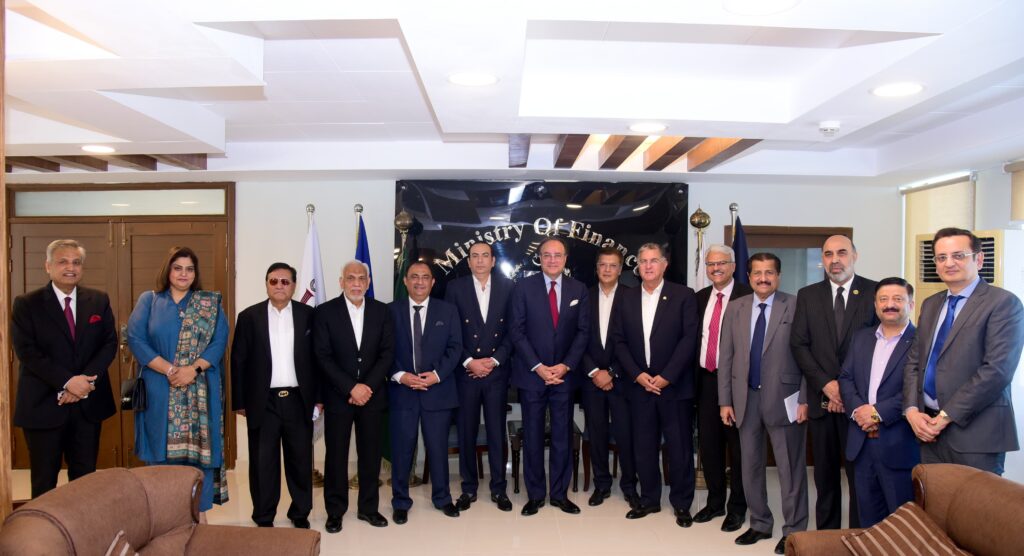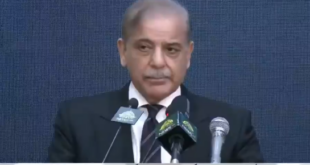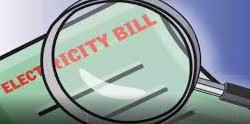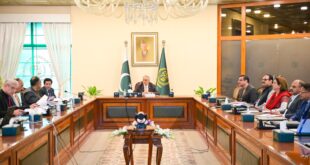
A significant meeting took place today between Federal Minister for Finance and Revenue, Senator Muhammad Aurangzeb, and a delegation from the Federation of Pakistan Chambers of Commerce & Industry (FPCCI).
The delegation was led by FPCCI President Atif Ikram, along with Patron-in-Chief S. M. Tanveer and Senator Noman Wazir, Chief Executive of FF Steel, KPK. The primary agenda of the meeting was to present a comprehensive Charter of Economy, developed by the FPCCI, to the Finance Minister and his team.
The FPCCI delegation emphasized that the Charter of Economy was designed to foster political consensus and aimed to engage all stakeholders, including political parties, to formulate an effective economic strategy. This initiative seeks to transcend political divides and address Pakistan’s economic challenges, with a focus on national development and economic growth. A particular emphasis was placed on catering to the needs of Pakistan’s expanding population, especially the youth, who constitute a significant portion of the demographic structure.
Senator Noman Wazir Khattak delivered a detailed presentation outlining the key proposals and recommendations included in the Charter. Among the major recommendations was the reorganization of specialized civil services through the establishment of dedicated groups in crucial sectors such as Energy, Finance, Industry, and Health. These groups would be responsible for leading policy formulation and ensuring informed decision-making. The Charter also advocated for greater reliance on solar and wind energy, recognizing them as the most cost-effective power sources. In this regard, it proposed capping wheeling charges for the Competitive Trading Bilateral Contract Market (CTBCM) at a maximum of Rs 4 per KWh.
Additionally, the presentation highlighted the need for a stronger focus on regional trade and development financial institutions, recommending that at least 20% of lending be allocated for long-term capital expenditure (CAPEX) and 10% for startup CAPEX. A stable exchange rate was suggested to bolster exports while discouraging the import of goods that do not comply with Pakistan Standards and Quality Control Authority (PSQCA) regulations. The Charter also underscored the importance of implementing a uniform gas pricing structure across industries to stimulate industrial growth.
Further proposals included transferring the ownership of State-Owned Enterprises (SOEs) to employees, allowing them to either manage these enterprises or proceed with privatization. It was suggested that pension funds be converted into equity. The presentation also called for strategic reforms in various areas, such as debt management, trade partnerships, tax compliance, energy efficiency, and the exploitation of mineral resources. Additionally, recommendations were made for adopting a progressive taxation model for the agriculture sector, improving governance structures, implementing pension and welfare reforms, advancing digitalization, and refining bankruptcy laws in Pakistan.
Senator Muhammad Aurangzeb welcomed the FPCCI delegation and commended their efforts in preparing a well-researched and timely Charter of Economy. He acknowledged the importance of such initiatives, particularly in aligning political parties on a shared economic vision. Reflecting on his past involvement in a similar Charter of Economy prepared by the Pakistan Business Council in 2020, he reiterated the necessity of uniting all stakeholders to combat declining living standards and promote sustainable economic growth. The Finance Minister emphasized that Pakistan’s economic recovery required a steady, unified effort rather than short-term fixes.
In response to the delegation’s proposals, Senator Aurangzeb briefed them on ongoing government reforms in key areas, including macroeconomic stability, taxation, energy, and the rightsizing of the federal government. He reassured the FPCCI representatives that the government remained committed to addressing pressing issues, particularly high energy costs for industries, to drive industrialization and export-led growth.
The FPCCI delegation expressed their appreciation for the Finance Minister and his team’s dedication to improving Pakistan’s economic landscape. They conveyed their hope that the government would continue its efforts in addressing critical economic issues to support industrial growth and national development.
The meeting was also attended by senior officials from the Ministry of Finance and the Federal Board of Revenue (FBR).
 BeNewz
BeNewz




